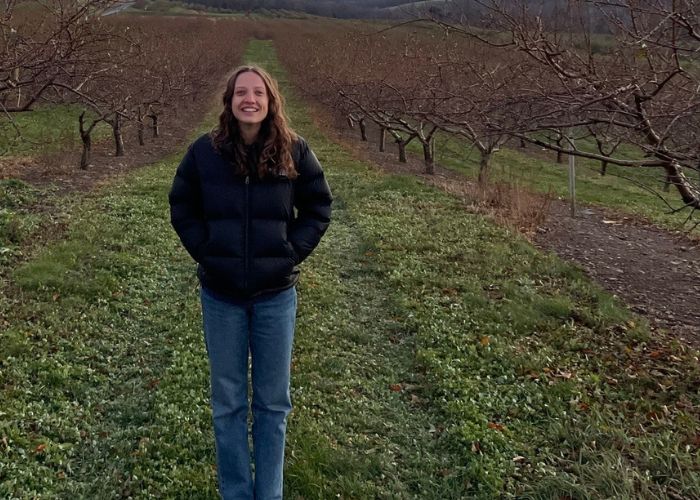
Every year, the Bailey COE awards fellowships to fund research opportunities for Wesleyan students across all majors and class years. Most recently, the COE awarded nearly 40 summer fellowships, including sociology and psychology double major Lacy George ’26, who spent her summer farming in Northern Italy and working at her local food bank in Seattle to conduct a narrative-based analysis of how food production, distribution, and waste is structured in small Italian and American communities. Her research aims to understand food justice solutions at the local level to potentially replicate at a national level.
Through WWOOF (World Wide Opportunities on Organic Farms), Lacy was connected to both a vineyard and small family farm in Italy. The organic vineyard where Lacy spent her first few weeks is located an hour outside of Bologna. Her daily work there consisted of checking plants for fungi, resourcing organic fertilizer from local plants, pruning branches, and working at the Bologna farmers market. At the farmers market, Lacy was able to interact with locals and witness the incredible social impact the vineyard had cultivated in the community. The experience was more than just labor: Lacy’s host family emphasized the philosophy of growing food, talking about plants as if they were people. “Pruning helps teach the plants how to grow,” they shared, offering Lacy a new perspective on farming.
Next, Lacy traveled to a small family farm located in the Italian Alps, where the day-to-day chores consisted of raking hay that would then be fed to the cows, whose poop would be shoveled and given to the chickens, whose eggs were collected and eaten at breakfast. She found the work rewarding and was astonished by the self-sufficiency of the system. The family she stayed with prioritized food quality over quantity by specifically sourcing from local farmers they knew.




While owners of neither the vineyard nor the farm were wealthy, both made meaningful efforts to provide nutritional food for their workers. Food in these Italian communities is viewed as sacred; there was never a bite wasted. Whatever food the workers did not consume went back to the animals. Sustainable, nutritional food meant stronger, healthier workers, and a happier community. This positive feedback loop is just one example of a local food system that could be modeled for potential food injustice solutions.
In contrast to her romantic yet demanding work in Italy, Lacy spent the last couple weeks of her summer working at a local food bank in Seattle, where shifts consisted of handing out food to clients, sorting through donations, and putting together delivery boxes. The majority of donations to the food bank were made up of slightly expired packaged goods from local grocery stores. This pattern emphasized the issue of food waste in the US, which Lacys notes could be mitigated through local initiatives such as food banks that offer grassroot solutions.
Connecting back to her life at Wesleyan, Lacy’s sociology/psychology double major and human rights advocacy minor helped prepare her for her time in the field. Specifically, Lacy drew upon lessons learned in Being Together: Affect, Care and Experimental Kinship/SOC243, taught by Ben Haber, as she experienced living within various family dynamics and in communities that relied on one another. Through adventure, hard work and reflection, Lacy’s understanding of food systems and their wide-reaching impacts provided her with valuable insights as to how local systems might hold the solution to global issues.